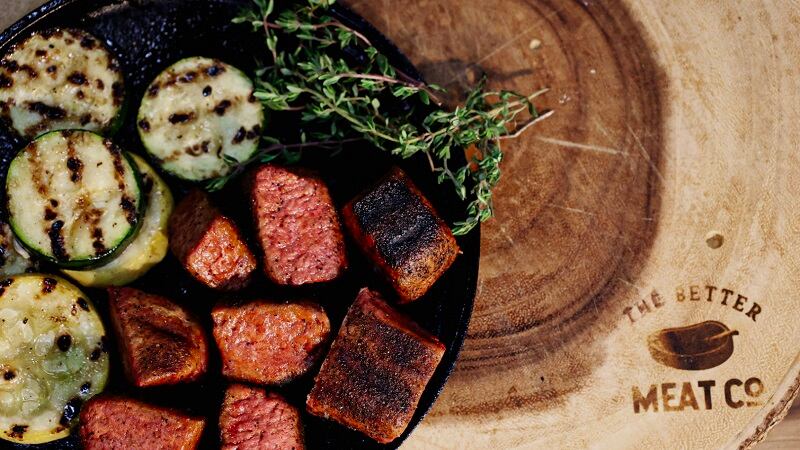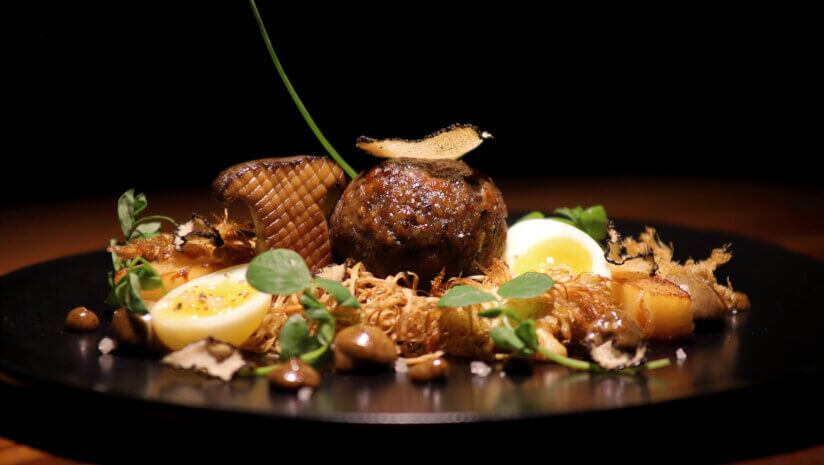“Many other governments around the world are trying to build up their own food production programs relating to future foods, and it is important that the United States continues to be a leader in food production, and that includes not just going big in the ways that we have always produced food but also going small with microbial agriculture. And what The Better Meat Co. is doing through microbial agriculture with mycoprotein is creating some of the most efficient ways that you can produce protein on a planet that is increasingly hungry for protein,” The Better Meat Co. CEO Paul Shapiro told FoodNavigator-USA.
‘We already have a mastery of how this process works in a 9,000-liter fermenter’
The Better Meat Co. will use the $1.4 million grant, made possible by DoD’s Distributed Bioindustrial Manufacturing Program, to scale up Rhiza’s production from a 9,000-liter fermenter to 150,000-liter fermenter, Shapiro said.
Rhiza’s is “a whole food [and] single ingredient that can act on its own as an alternative meat,” that does not require extrusion, Shapiro said.
“The scale-up process from lab to a few 100 liters is a very big gulf because you are going from test tubes or shaker flasks into an actual bioreactor,” Shapiro said. “We already have a mastery of how this process works in a 9,000-liter fermenter, which we have run literally more than 100 times now. And so, the scale up to 150,000 is less difficult than going from lab to 9,000.”
Recently, the Better Meat Co. shifted to a continuous fermentation process — a process that can produce higher fermentation yield by constantly flowing material into a bioreactor at the same time as harvesting the finished product — improving production efficiency and reducing manufacturing costs by 30%, Shapiro explained.
While commercialization of its mycoprotein is a key priority, Shapiro noted that his company will continue “to make gains both through feedstock optimization and through fermentation parameters.”
He elaborated: “There really is no end to the improvements. We are engaged in a constant campaign of optimization that never ends. And so, we get our goal is to continue to get better titer, to get higher protein [and] to get better yield and faster growth. And so even once we have scaled our process, we will continue to run an R&D center that will constantly be improving upon what we do.”
The Better Meat Co. prepares for upcoming funding round
In the coming months, The Better Meat Co. will support commercialization by raising another round of funding, Shapiro noted. The biotech company already has raised $27 million, including investments from Greenlight Capital and Green Circle Foodtech Ventures.
“We have already pioneered our technology to the point where it is ready to be commercialized. We have already been awarded numerous patents on our technology, and we have successfully received GRAS status from the FDA. Not only did we receive GRAS status from FDA, but we are the only micro protein to have applied for and received GRAS status from USDA for putting mycoprotein into meat,” Shapiro said.
He added, “The only thing left for us to do is to scale the technology. There are no more inventions that need to be made — although we will continue to innovate — there are no more patents that need to be obtained — though of course, we continue to file new patents. There is nothing left for us to do as far as what is absolutely necessary to commercialize than to scale.”
How plant-based can be a value-add to animal-based meat
The Better Meat Co. is “bullish” on the hybrid animal- and plant-based meat trend, Shapiro said.
In 2020, Perdue Farms and The Better Meat Co. partnered to develop the Perdue Chicken Plus, a 50-50 animal and plant-based chicken product that is available in 7,000 supermarkets nationwide, he said. However, the plant protein formula does not contain Rhiza due to the scale that Perdue Farms sells, he noted.
The Perdue Chicken Plus shows that consumers have an appetite for blended products, Shapiro said. Companies and marketers need to be careful how they message blended products, ensuring that they highlight how plant-based ingredients can enhance meat products, he suggested.
“If you go to Jamba Juice and you order a smoothie, and they say, ‘Do you want to boost your smoothie with hemp seeds or matcha or protein powder?’ You do not think of yourself as getting less smoothie. You think of yourself as getting a better smoothie. In fact, you are willing to pay more for that enhancement. That is the same thing [for hybrid meat]. Hybrid meat needs to be marketed as a better meat, not just a less meat product,” Shapiro said.





